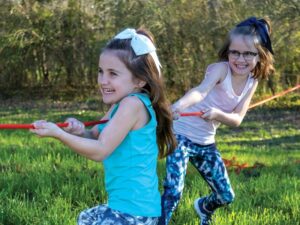As May approaches, school children typically have one thing on their mind, summer break. Thoughts of school are replaced with what they are going to do or where they are going, with some going on vacation; some visiting relatives; and some staying home, hanging with friends, and enjoying their break.
For others, they look forward to summer camp where they can reunite with friends, explore the outdoors, and do activities they had been waiting for. Children going for the first time, however, could be frightened. They aren’t just going, but going without parents, possibly even by themselves without friends. Because of this, parents may worry about sending their children to summer camp, however, there are ways to calm them if they feel anxious.
Signs of Anxiety
Before camp, parents may notice their children’s behavior changing and wonder if it is making them anxious. As a National Certified Counselor focusing on child and adolescent therapy with specialized training in treatment for anxiety, Cheryl Brodnax informs parents on how to detect signs of anxiety in their children. “Common signs include excessive worrying, fearfulness, clinginess, not wanting to be away from their parents, or acting out over small things,” she says. “Less obvious are often masked as illness, like fatigue, upset stomach, headache, muscle tension, and eating or sleeping changes.”
Reassurance is Key
Concerning camp, parents can reassure children that everything will be okay once they get there. In his 19 years with Twin Lakes Summer Camp, director Andrew Vincent notices anxious children arriving at camp but reassures parents they can help through encouragement and saying how fun camp will be. “Framing camp as something they can do and assuring they will have a great time is important,” he says.
Brodnax also reassured her children. “A big game changer was helping them adjust to what scared them about going, like meeting new people or sleeping away from home for the first time, and planning in advance reduced fear of the unknown,” she says. “Knowing how the camp was being run, and who was in charge helped with my own anxiety and gave me greater confidence to address my kids’ concerns.”
Build a Relationship
Though calming children beforehand, anxiety may return once arriving. Vincent has seen many children who were anxious about starting camp but found the best way for them to calm children was to build relationships to get to know them better. “Without relationship and connection, the rest of our efforts can fall flat,” says Vincent. Through this, he encourages counselors to obtain information from children to see what they like to make them more comfortable. “By asking questions, counselors get to know children better and find out general information and their interest level in camp. The more we get to know each child, the more we can reassure them and direct their thoughts to positive aspects of camp and areas of interest.”
Keep in Touch
While children are getting attention, parents can still keep in touch. “Letters and one-way emails are great to receive,” says Vincent. “We encourage connecting with them this way. However, parents should keep it positive and about the child’s enjoyment, rather than lots of questions that could produce fears or emotions they haven’t considered.”
With her own children, Brodnax connected similarly. “Sending letters and care packages helped them feel connected to home,” she says. “However, phone calls were discouraged because it could trigger homesickness.”
Supportive Staff is Important
If parents are unsure about sending their children to camp, Vincent reassures parents that while they may be nervous at first, children generally do open up more “One of the most common differences seen and comments received is that campers becoming more confident and independent from their experiences,” says Vincent. “Camp encourages kids to be themselves and work through the intricacies of relating to and getting along with others. Having supportive staff supervise and assist, as needed, alo helps guide them, but it does not get in the way of this process.”
Both Vincent and Brodnax ultimately saw camp as a positive experience for their children. “Although nervous before, they followed through and returned with many stories, new friends and confidence. Worries they had were replaced with fun experiences. Facing fears and trying something new helped develop new skills and learn that many anxieties aren’t grounded in reality. They developed increased self-esteem and efficacy to draw from next time they face anxiety,” says Brodnax.
Similarly, Vincent also noticed positive changes in his children. “All three had great experiences at camp,” says Vincent. “There were plenty of things each worked through, but as a result, we noticed increased maturity, self-confidence, and relational skills as a result of camp experiences. I believe that each experience built on the others. Success builds confidence and each week helped them add more ‘tools in their tool belt’ to deal with many situations that may come their way in the future.”





